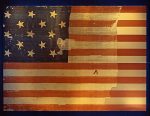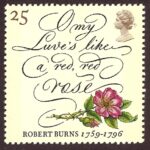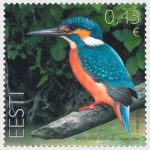This coming Wednesday (the 26th) is the birthday of Robert Frost (1874–1963), one of the most important American poets of the twentieth century. In his honor, our homeschool poem-of-the-week for this last week of March is Frost’s little early-spring masterpiece “Nothing Gold Can Stay”:
Nothing Gold Can Stay
Nature’s first green is gold,
Her hardest hue to hold.
Her early leaf’s a flower;
But only so an hour.
Then leaf subsides to leaf.
So Eden sank to grief,
So dawn goes down to day.
Nothing gold can stay.
This is a perfect poem for memorization. Why not memorize it yourself along with your students this week and so give them a new friend for life. (You can take turns, alternating lines, until you have it all down.)
![[Robert Frost]](https://riverhouses.org/wp-content/uploads/2019/03/frost-stamp-193x300.jpg) Like many of Frost’s poems, “Nothing Gold Can Stay” has a simple structure and a deep meaning. Invite your students to investigate the structure first. What is the rhyme scheme? We have gold–hold, flower–hour, leaf–grief, and day–stay, so I make it out as AABBCCDD — a set of four rhymed pairs or couplets. The rhythm (meter) is mostly iambic trimeter, a very compact form, with six syllables in each line (all except the last). The poem’s end-stopped character is also prominent: every line is either a full sentence or a full clause, making a pause in reading at the end of each line feel natural. (In more complex poems, the sentences and other grammatical units often run over the ends of the lines; such poems are said to be enjambed rather than end-stopped.)
Like many of Frost’s poems, “Nothing Gold Can Stay” has a simple structure and a deep meaning. Invite your students to investigate the structure first. What is the rhyme scheme? We have gold–hold, flower–hour, leaf–grief, and day–stay, so I make it out as AABBCCDD — a set of four rhymed pairs or couplets. The rhythm (meter) is mostly iambic trimeter, a very compact form, with six syllables in each line (all except the last). The poem’s end-stopped character is also prominent: every line is either a full sentence or a full clause, making a pause in reading at the end of each line feel natural. (In more complex poems, the sentences and other grammatical units often run over the ends of the lines; such poems are said to be enjambed rather than end-stopped.)
The poem’s subject is early spring and the opening of the very first buds and flowers, which is why we chose it as this week’s poem. In temperate climes, little golden buds and tiny yellow flowers often appear on many trees before the leaves come out, but they only last for a short time until the canopy of green foliage unrolls and expands. Frost takes this simple observation and extends it to everything in the world. All the golden buds, all the early flowers — whatever they may be — give way with time. A Christian philosopher might read that as a sign of our fallen world (“So Eden sank to grief”), while a naturalist might see it as reflection of the ordinary cycles of nature all around us (“So dawn goes down to day”). Both are perfectly acceptable literary interpretations. (If you want a glorious vocabulary word for the week, send your students to your family dictionary to look up ephemerality.)
![[Spring Buds]](https://upload.wikimedia.org/wikipedia/commons/2/28/Cornus_mas_bud_nuremberg_keichwa.jpg)
As you explore your homeschool neighborhood this early spring, take special note of the earliest buds and flowers that are just beginning to open. And as you do, practice a line or two with your students: “Nature’s first green is gold.” “Her hardest hue to hold.”
What wonderful words and poetical productions are you and your students examining in your homeschool this Leo Term? 😊
❡ So dawn goes down to day: If a special line or turn of phrase happens to strike you in one of our weekly poems, just copy it onto your homeschool bulletin board for a few days and invite your students to speak it aloud — that’s all it takes to begin a new poetical friendship and learn a few lovely words that will stay with you for life. 🌱
❡ Literary lives: The website of the Poetry Foundation includes biographical notes and examples of the work of many important poets (including Robert Frost) that are suitable for high school students and homeschool teachers. ✒️
❡ Here, said the year: This post is one of our regular homeschool poems-of-the-week. Print your own River Houses Poetry Calendar to follow along with us as we visit fifty of our favorite friends over the course of the year, and add your name to our River Houses mailing list to get posts like these delivered right to your mailbox every week. 📫
❡ Homeschool calendars: We have a whole collection of free, printable, educational homeschool calendars and planners available on our main River Houses calendar page. They will help you create a light and easy structure for your homeschool year. Give them a try today! 🗓
❡ Support our work: If you enjoy our educational materials, please support us by starting your regular Amazon shopping from our very own homeschool teaching supplies page. When you click through from our page, any purchase you make earns us a small commission at no extra cost to you. Thank you for helping us to keep going and growing! 🛒
❡ Join us! The aim of the River Houses project is to create a network of friendly local homeschool support groups — local chapters that we call “Houses.” Our first at-large chapter, Headwaters House, is now forming and is open to homeschoolers everywhere. Find out how to become one of our founding members on the Headwaters House membership page. 🏡




